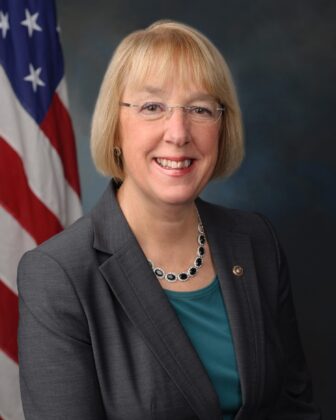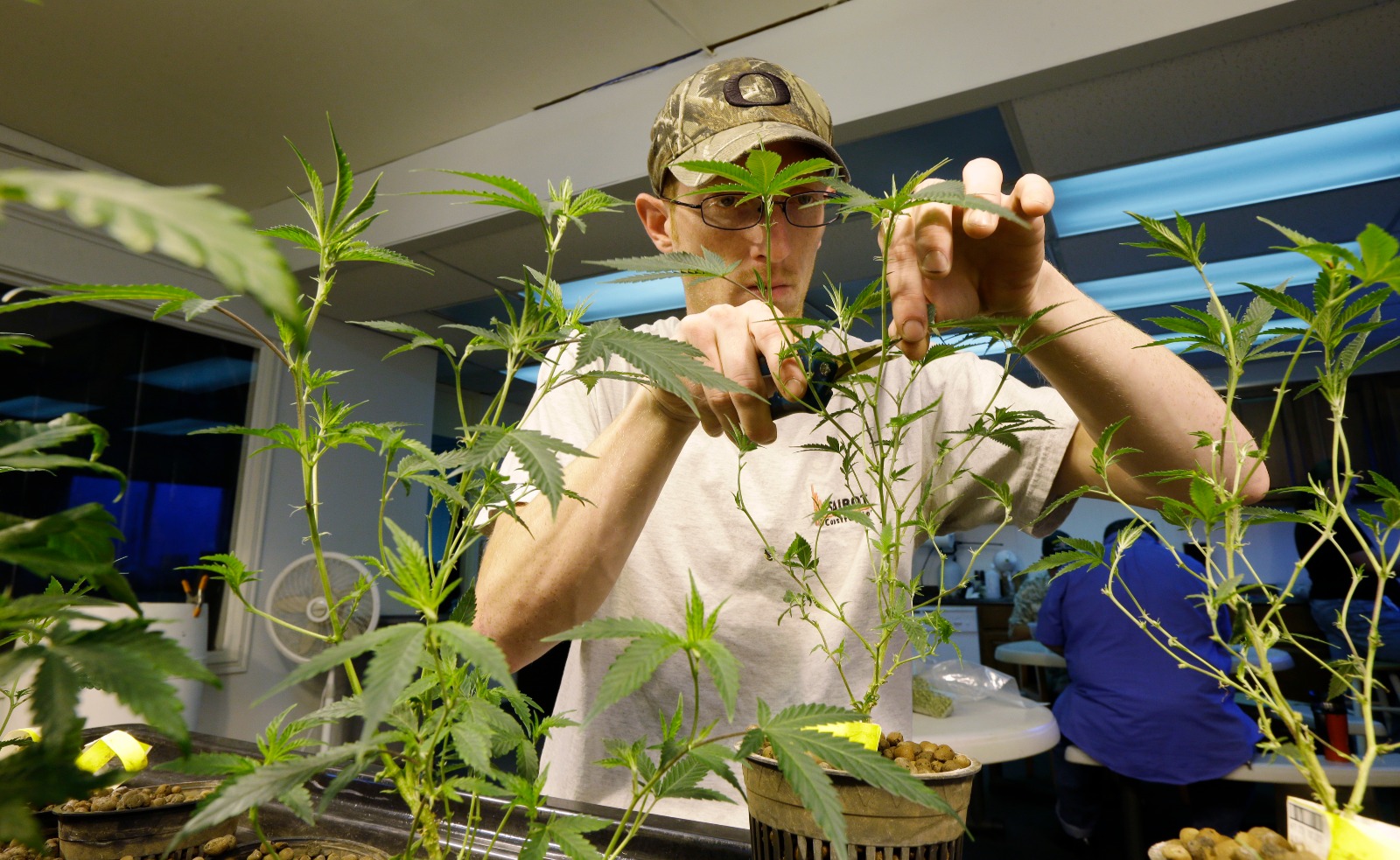Federal officials consider immigrants “drug traffickers” even in states where cannabis has been legalized
By Kaylee Tornay / InvestigateWest
This InvestigateWest report was co-published exclusively by Politico.
As an immigrant, Maria Reimers tried to do everything by the book. She entered the U.S. legally, married an American citizen and secured a green card to work. Together, she and her husband managed to open a small storefront in Ephrata, a dot of a town in Washington state.
But when Reimers tried to become a U.S. citizen in 2017, she was denied for lack of “good moral character.” Federal immigration officials deemed her work “illicit drug trafficking,” because the couple’s business in Ephrata sells state-regulated cannabis. Though it is legal in Washington state, their retail shop has put Reimers’ dream of citizenship in jeopardy. She gets to keep her green card, but her attorney recommended that she not visit her family in El Salvador, because of the possibility that she’d be detained at the border when she returned.
“We didn’t think about the consequences of getting involved, or how the federal law was going to affect us,” Maria Reimers said. “I’ve been in this country 20 years. I am contributing to the country, but I don’t have the moral character to become a citizen? Do you think it is fair?”
Immigrants across the country in states where cannabis has been legalized share Reimers’ frustration. The federal government still considers cannabis illegal, but since states began to legalize sales in 2014, it has largely looked the other way when U.S. citizens get involved in the burgeoning industry. Immigrants, however, still face a litany of consequences — including denial of citizenship, lifetime bans from lawful permanent residency and even deportation.
It’s difficult to estimate the number of legal immigrants who could be impacted by the policy. The federal government doesn’t track employment in the cannabis industry, and the companies that do don’t collect any data on how many immigrants are participating in the workforce. Foreign-born workers make up about 18 percent of the U.S. workforce, according to a 2022 report by the Bureau of Labor Statistics. While noncitizen workers are only a subset of that group, the number of immigrants like Reimers who could be vulnerable to immigration consequences for their work is likely in the thousands.
Meanwhile, advocates and U.S. senators in states where cannabis is legal have asked for help from President Joe Biden, who at times has shown a more tolerant attitude toward cannabis. In an executive order in October 2022, Biden offered pardons to citizens with federal convictions for simple possession of cannabis, and directed agencies to review how cannabis should be classified. In August, the Department of Health and Human Services recommended that it be moved from Schedule I, classified as a highly addictive drug with no medical usefulness, to Schedule III, a category with less potential for misuse. Now it’s up to the Drug Enforcement Administration to make the final call, and there’s no announced timeline for when that will happen.
But under the Biden administration, the Department of Homeland Security (DHS) has not changed how immigration proceedings judge cannabis work, leaving vulnerable workers like Reimers unable to naturalize or secure green cards and afraid that they could be expelled from the country over their livelihoods.

Advocates and U.S. senators in states where cannabis is legal have asked for help from President Joe Biden, who at times has shown a more tolerant attitude toward cannabis. (Gage Skidmore photo)
Denying citizenship or lawful permanent residency for legal marijuana work is “just an interpretation (of the law),” said Kathy Brady, directing attorney of the Immigrant Legal Resource Center, a California-based nonprofit. “What the administration could do would be to change their interpretation, at least for the people working in the legal industry,” she said. “I talk with so many people who are getting really screwed by this.”
That interpretation sets up a stark disparity: Their bosses and American co-workers are part of a booming industry, while immigrants are labeled criminals.
“No civil or criminal penalties for ‘drug trafficking’ fall on the executives of these [cannabis] corporations, or even any of the U.S. citizen employees; the only enforcement targets are immigrant workers,” wrote the Immigrant Legal Resource Center in an October 2022 call to action responding to Biden’s pardons. (The White House did not respond to requests for comment on this story.)
The Reimers, meanwhile, have sued U.S. Citizenship and Immigration Services (CIS) over Maria’s denial. They lost one appeal in 2022, and the 9th U.S. Circuit Court of Appeals upheld the denial again in July. In October, they filed an appeal with the U.S. Supreme Court. So far, the court has not agreed to hear the case.
The couple has argued that Maria is not receiving the same equal protection from federal enforcement of cannabis laws that citizens enjoy. But the courts have maintained that the federal government is treating the Reimers exactly how current law and policy dictates for anyone who isn’t a citizen.
The broad impact those policies are having on immigrants has attracted the attention of the senior U.S. senators from Oregon and Washington, who called for Biden to soften them.
“Individuals legally using cannabis under state law or working in state-licensed cannabis businesses should not face immigration penalties that treat them as criminals,” said Democratic Sen. Ron Wyden of Oregon. “I support calls for the administration to address these inequities administratively, and I will continue to push to enact legislation to permanently reform our archaic federal drug policy.”
* * *
When President Biden took office, Brady thought his administration might change the rules so that immigrants wouldn’t be exposed to harsh penalties for state-regulated cannabis work. But so far, it hasn’t happened.
The Immigrant Legal Resource Center has for years called on the DHS to exclude legalized cannabis from its definition of “illicit drug trafficking,” which is a basis to deny both citizenship and permanent residency applications. (CIS and the DHS declined an interview request for this story.)
As a precedent for that type of administrative change, Erin McKee, co-director of the Oregon Justice Resource Center’s immigrant rights project, pointed to steps that the DHS took in 2014 to reduce family separations. Then-Secretary of Homeland Security Jeh Johnson directed the agency to clarify its definition of “extreme hardship” to allow more undocumented immigrants to remain stateside for longer while applying for residency.
With cannabis, however, CIS has maintained its policy, making explicit in a 2019 memo that immigrants involved with the cannabis industry cannot satisfy the “good moral character” standard required to receive citizenship.
Legislators pushed back on the memo, asking the DHS and the Justice Department in a letter not to allow the policy to be continue. Wyden and Sens. Jeff Merkley (D-Ore.) and Patty Murray (D-Wash.) were among the signatories. Pennsylvania Rep. Brendan Boyle introduced a bill in 2021 that would have undone the policy change, but it failed to get out of committee.
In separate statements, Wyden and Murray said they still want to see immigrants find relief from consequences for their work in state-regulated cannabis.

Democratic Sen. Patty Murray of Washington
“Immigrants who are going through the naturalization process should not be penalized for gaps in state and federal policy when it comes to cannabis,” Murray said. “There is absolutely nothing wrong, for example, with doing state-legal work in a cannabis business in a state like Washington or Oregon, and no reason it should be held against someone seeking citizenship.”
Murray and others point to this issue as one of many reasons to legalize cannabis at the federal level. Bills to do so, however, have made little headway; instead, federal agencies including the Drug Enforcement Agency have been studying the possibility of downgrading cannabis from a Schedule I to a Schedule III drug, which could ease the consequences for medical cannabis work and use.
The status quo, meanwhile, has cast likely tens of thousands of immigrants into legal limbo — or, for some, out of the country.
McKee said one of her clients is permanently barred from receiving a green card after disclosing she worked at a dispensary. The woman received federal work authorization through the Deferred Action for Childhood Arrivals program created by President Barack Obama in 2014. She has no criminal record and is married to a U.S. citizen.
“She is exactly the almost unheard-of easy case that should have been an easy approval for a green card,” McKee said. “Except for the fact that she had worked at a legal cannabis dispensary, with work authorization by the government.” (The woman declined to provide comment directly out of concern it could affect her future immigration prospects.)
“It affects so many people who think just like she did, that she was doing everything right, everything by the book,” McKee said. “She had no clue this would have such severe and devastating consequences for her.”
Several attorneys said they simply discourage prospective clients from applying for green cards or citizenship if they have cannabis work in their history. They said the 9th Circuit Court ruling in Reimers case further serves as a warning, though the ruling itself was unpublished, meaning it can’t be considered as precedent in other court cases.
Alycia Moss, the Reimers’ attorney, said they face a tough battle in their appeal to the Supreme Court. To show that Maria Reimers faced undue harm, the appellate court ruled that she would need to provide an example of a foreign-born worker in legal cannabis gaining citizenship to show why her denial should be overturned.
Four immigration attorneys not involved with the Reimers case said they knew of no such example. And even if an immigrant did receive citizenship despite having worked in cannabis, Moss said she doesn’t believe that person would be eager to step forward.
“Who’s going to want to come forward and say, ‘Hey, I got mine?’” Moss said. “That is an impossible thing to prove.”
* * *
Even in some of the first states to legalize cannabis, the potential ramifications for immigrants aren’t widely known, even among state regulators.
“They could have warned us that anyone who was not a citizen already … would have had problems if we were going to get involved,” Maria Reimers said. “I think they kind of failed these people, including me.”
Some states make it easier to find such information. After Denver’s mayor in 2019 publicly appealed to the Trump administration for relief for two workers who were denied citizenship just like Maria Reimers, Colorado changed its laws to require its licensing authority to warn applicants of the immigration risks. It maintains a detailed webpage about the federal implications of cannabis involvement — not just in terms of immigration, but federal student aid and federally subsidized housing.
But in Washington state, where cannabis has been legal just as long, the Liquor and Cannabis Board had no information published on its website about the immigration ramifications of cannabis work. Oregon, which legalized cannabis in 2014, doesn’t either.
The Washington Liquor and Cannabis Board alerts new cannabis business owners that they may face restrictions around gun ownership and banking because of the divide between state and federal law. But the risk to immigrants “has not been something that has come before” the board, said spokesperson Brian Smith. Only after InvestigateWest’s inquiry did Washington’s cannabis board add a disclaimer to its licensing webpage stating that work in legal cannabis could have “adverse immigration consequences.” Mark Pettinger, spokesperson for the Oregon Liquor and Cannabis Control Board, said the agency would discuss doing the same.
Others feel that doesn’t go far enough. Democratic Washington state Rep. Sharon Wylie, who co-chairs the House Regulated Substances and Gaming Committee, said she wants to explore how to establish requirements for all cannabis businesses to provide information to any prospective employees about immigration consequences.
“I talked to my co-chair, and we’re both interested in raising the issue with the committee and have put it on staff radar to see what would be the most practical way to protect people that are living in our state,” Wylie said. “I like the idea of basically asking that vendors or people that have the grows and retail stores make sure that people they hire know that there’s a risk.”
* * *
The Reimers wish they’d never gotten involved in the industry. They have been trying to sell their business for a few years without any luck. While waiting to see how their Supreme Court appeal unfolds, they are considering all their options.
Maria Reimers could choose to stop working at the business, which could help her gain citizenship in the future. Unlike the admissibility standards for a green card, the “good moral character” standard for citizenship generally looks only at an applicant’s past five years.
But now that immigration officials are aware of her connections to cannabis, she’s scrapped her plans to see her family in El Salvador.
“I was hoping I could go visit my grandmother. I thought if I become a citizen, maybe I could help my mother. But I am incapacitated,” she said. “I’ve been cut off. I can’t really do much.”
She paused.
“I can keep paying taxes, though.”
FEATURED IMAGE: In this July 1, 2014, photo, Mike Thrapp, head grower at Sea of Green Farms, a recreational pot grower in Seattle, trims damaged leaves from marijuana plants that will be packaged and sold for recreational use. After gaining voter approval in late 2012, the legal sale of recreational pot began on July 8, 2014 in Washington state . (AP Photo/Ted S. Warren, File)
InvestigateWest is an independent news nonprofit dedicated to investigative journalism in the Pacific Northwest. Reach reporter Kaylee Tornay at kaylee@invw.org.
CORRECTION: This article has been updated to correct Kathy Brady’s title.



